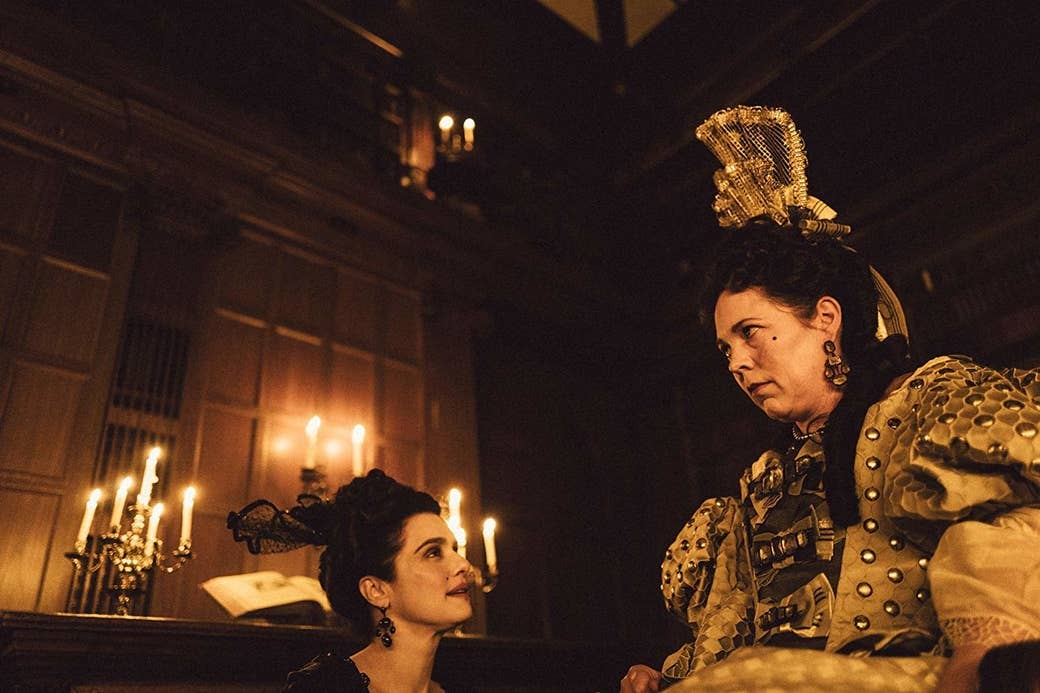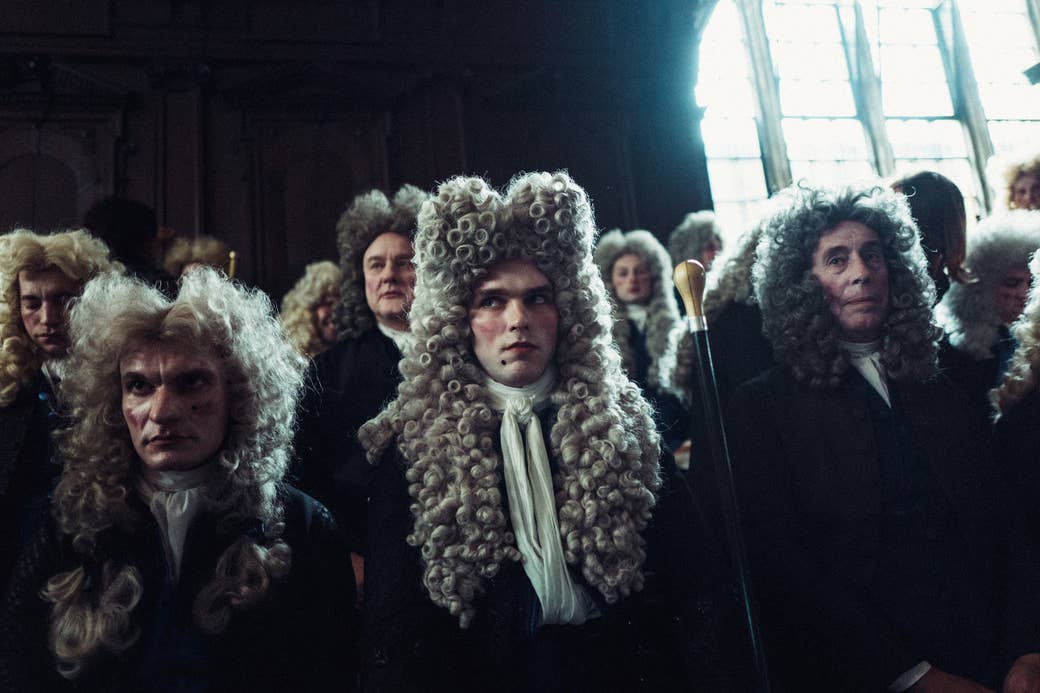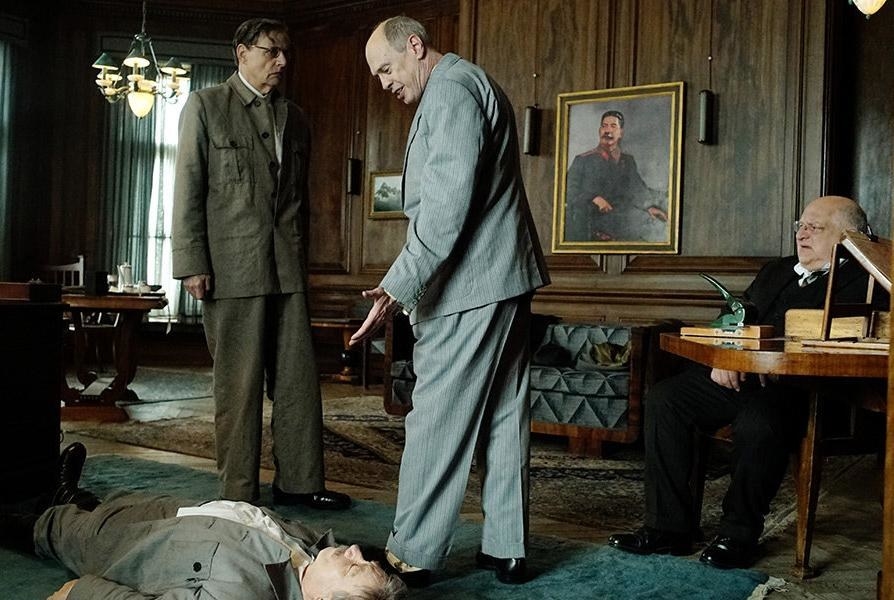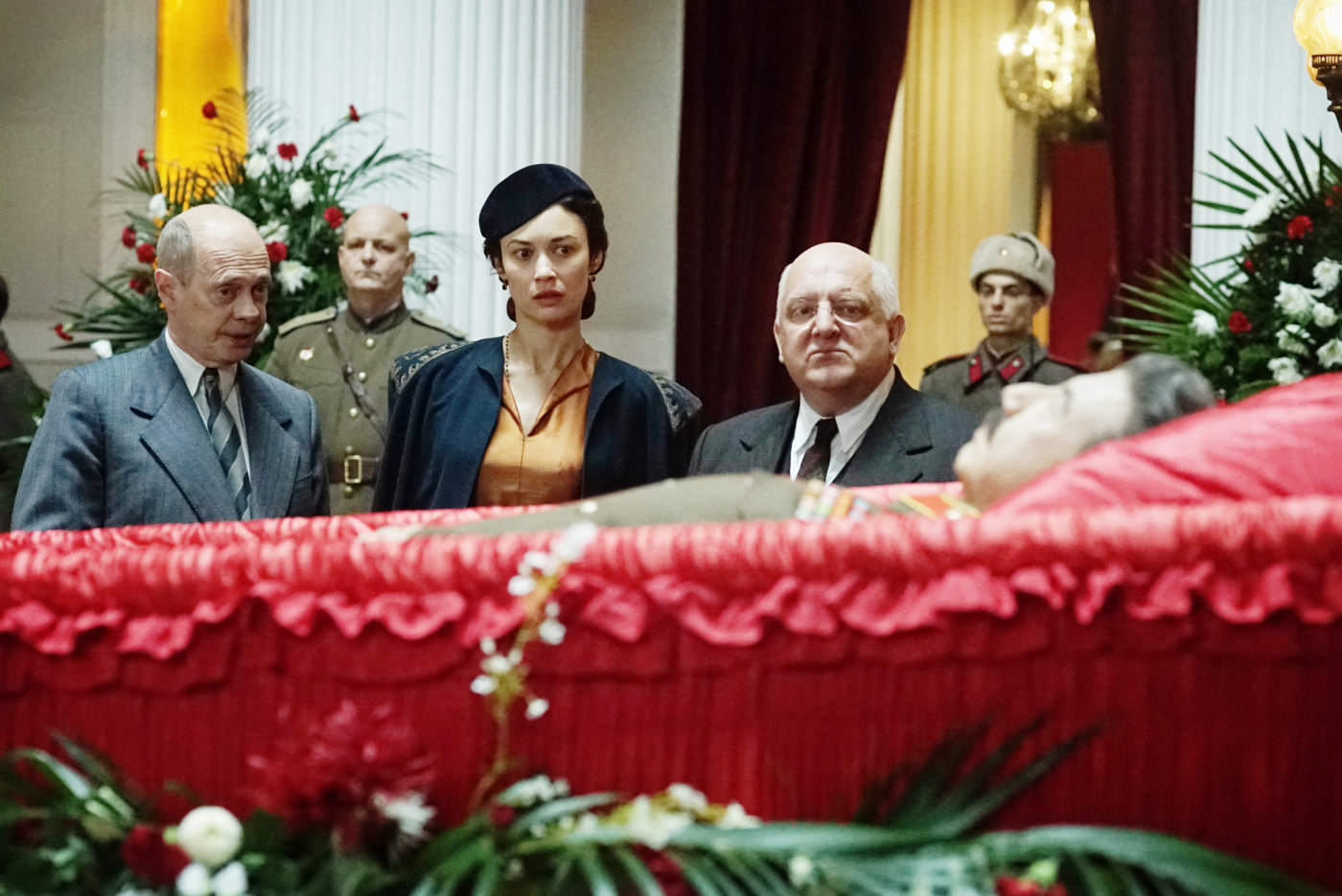
I've never quite bought the idea that satire is dead or dying, something people have been declaring ever since Donald Trump got elected. Certainly, satire is something the Trump presidency has been unusually resistant to, like an infection that can't be treated with standard antibiotics. How can you skewer someone who appears to lack essential qualities like a capacity for shame or self-reflection? Parodists have tried turning Trump into a literal cartoon or a talk show host or a Saturday Night Live fixture, volleys that have bounced right off because no one can own the president harder than he regularly owns himself — his power has been in proving how little that matters to his base.
But I don't believe it's comedy that Trump eludes so much as something larger: fictionalization. He just doesn't work as a character. It's hard to tell good stories, funny or not, about someone who already comes across as the stuff of bad art — who would beggar belief if he were an author's creation, too easy and too broad. For these reasons and more, if there are any great movies to be made about Trump, they're probably not imminent.
In the meantime, Trump’s unignorable presence has sapped any urgency out of the movies about US politics that have come out this year (Adam McKay's Dick Cheney film Vice, a still-unseen question mark, isn't due until December). Maybe some other year it might have been easier to get invested in April’s Chappaquiddick or this month’s The Front Runner, both of them prestige-projecting dramas about the scandals that undid the presidential hopes of Democrats past. But watching either of them now feels like the equivalent of listening to someone try to deliver a serious lecture in a room full of people screaming, "Build that wall!"
Maybe that's why the two movies closest to capturing the punch-drunk surreality of present-day US politics take place in settings far removed from both the US and the 21st century: The Favourite, out on Friday, and The Death of Stalin, released in March. This pair of pitch-black comedies are set, respectively, in the 18th-century British court of Queen Anne and the 1950s Soviet Union in the wake of de facto dictator Joseph Stalin’s passing.
Both movies take liberties with the real history of sly, petulant authoritarian leaders and the people who scramble to gain their favor, guess their whims, and jockey for position — and they manage to be bitterly funny and bleak at once. If these movies feel like indirect answers to the problem of how to satirize Trump, it's because they're reminders that there's nothing new about the impulses toward autocracy. And the absurdities in each make the horror all the more stark, with the ludicrous and the grim co-existing in a way that feels — well, very 2018.

There's a war with France going on in the background for most of The Favourite, but we never get to see it. The film unfolds almost entirely on the grounds of the palace in which Queen Anne (Olivia Colman) resides. That's where various courtiers make bids for her attention, or, failing that, the attention of the woman who has her ear: Lady Sarah, the Duchess of Marlborough (Rachel Weisz), who may not sit on the throne but who's made herself the functional day-to-day leader. Sarah is Anne's closest adviser — her manipulator, protector, bully, and secret lover, the latter an added complication in a relationship that could generously be described as dysfunctionally codependent. Sarah wants war, and so war continues, the fate of thousands turning on the whims of a leader who seems to have no contact with the outside world, and who operates on the advice of whoever she feels most partial to at the moment.
Colman's performance is chillingly, hilariously resonant without ever tipping a hat to present-day similarities. It doesn't need to. Her Anne is a daffy masterpiece of elevated insecurity, prone to asserting her status whenever she feels uncertain — she demands a page look at her, then barks, "How dare you? Close your eyes!" But she's also uniformly disinterested in the actual details of governance, getting testy when those obligations lead her to feel neglected: "It's my state! I'm the business of state!" At one point she's shown sprawled out sick in bed while her advisers lay a map on top of her to explain tactics, treating her as both audience and furniture, the most and least important person in the room. Queen Anne is not without pathos — she didn't choose this role, is in poor health, and grieves her 17 lost pregnancies — but it would be a mistake to see her merely as pitiable. She is still capable of changing and ruining lives with the flick of a finger.
The Favourite is really about the idea that an absolute leader, or the illusion of one, is its own mass delusion.
It's possible that Anne — a peevish deity, staggering lost through the hallways of her own home, who eats cake until she vomits and then eats some more — is dealing with mental illness. But it doesn't really matter, because either way she's the queen. And The Favourite is less interested in her than in exploring how everyone else accommodates, flatters, and works around their ruler, if need be, no matter how she's behaving. The heavy use of a fisheye lens adds to the sense that gravity has been warped, and with it everyone's priorities; making friends with the queen's pet rabbits becomes just as high-stakes as advocating to prolong a national conflict.
The Favourite is both farcical — there's a ridiculous, deadpan take on a country dance sequence that's one of the greatest things I've seen all year — and the least overtly weird movie that its director, Yorgos Lanthimos (of The Lobster and The Killing of a Sacred Deer), has ever made. Monarchy, in this case, is odd enough. It's technically a story of palace intrigue and the competition between Sarah and her impoverished cousin Abigail (Emma Stone), a new arrival who turns out to be a formidable schemer. But The Favourite is really about the idea that an absolute leader, or the illusion of one, is its own mass delusion — a portrait of insularity in which someone's morning mood might determine the direction of a country that should count itself lucky to be a few centuries away from the advent of cable news.

The historical outline of The Favourite is real, even if the way the details are recounted is preposterous. The same is true of Armando Iannucci's The Death of Stalin, which came out this spring and picks up in 1953, right before Stalin suffered a cerebral hemorrhage. The actors don't attempt accents or physically resemble the real-life figures they're playing — its cast is made up of the likes of Steve Buscemi as Stalin’s eventual successor Nikita Khrushchev, Simon Russell Beale as secret police chief Lavrentiy Beria, and Jason Isaacs as military commander Georgy Zhukov, and they say things like, "All of you can kiss my Russian ass!"
This very un-Soviet approach to a Soviet story is only disorienting at first, until it feels like a stroke of genius — a way of insisting that the events the film depicts can't and shouldn't be considered from a comfortable distance. Stalin, who left no succession plan, was a head of state who cultivated continual uncertainty, fear, and reverence in his inner circle as well as the country at large. In an early scene, two party members wave goodbye to a third after a raucous dinner and reflect on how it's probably the last time they'll see him, as Stalin's put him on a list to be disappeared: "It would be simpler and cheaper if they just drove straight into a river," Beria says. When Stalin does collapse, as promised, not far into the film, it's hard to find him good medical care because the Kremlin’s doctors (most of them Jewish) were the target of a recent purge.
It's tempting to glom on to certain too-perfect Trumpian parallels — like the arrival of treasured first daughter Svetlana, played by a frazzled Andrea Riseborough, and doofus son Vasily (Rupert Friend), or the way one character yells about a "false narrative" being used as a tool against someone. But where The Death of Stalin really reverberates is in how little ideology has to do with any of the machinations before Stalin's body is even cold. The characters have spent a long time cowering at their leader's feet like dogs expecting to get kicked, laughing at his jokes and agreeing with his arguments and hoping not to get banished (or worse), but without any more noble endgame than jockeying to take his place — to become the one who inspires dread as opposed to the ones feeling it.

This fumbling Council of Ministers may mouth party platitudes, but they don't think about policy as anything more than a gesture to get the public on their side. When Beria suggests they temporarily pause the campaign of terror their late leader had instituted, Khrushchev yelps, "That was my idea — I was going to be the reformer!" with all the betrayal of someone whose friend just showed up at his Halloween party in an identical costume. The idea that there might have been anything, say, wrong with the purging of dissenters is not open for discussion — perception is all that matters. Beria is the man who was overseeing those arrests and executions in the first place. "You’re the good guy now? You locked up half the nation," Khrushchev says to him. "Yes, and now I’m releasing them," he responds.
Iannucci also made the bracing British sitcom The Thick of It and its slightly lighter-weight American sibling Veep, both of which treat the workings of their respective governments like a higher-stakes version of The Office. The same mundanity is present in The Death of Stalin — only the context is so much grimmer, because the government in question is fueled by fear, with people getting dragged off in the night, shipped to forced labor camps, or tortured and executed. It is quite possibly the darkest workplace comedy of all time, in which walk-and-talks happen in hallways where soldiers hurl someone down the stairs or shoot them in the head in the background. While The Favourite is a deliriously warped portrayal of an absolutist power structure, The Death of Stalin is about the reverberations of one. Its message, particularly unsettling at this moment, is that even the worst imaginable reality can eventually start to feel normal.

In an interview with Politico earlier this year, the Onion's editor-in-chief, Chad Nackers, talked about how the satirical news site was approaching the age of Trump and how it differed from the three previous administrations that Nackers had been involved in covering. Hillary Clinton, he admitted, would have been a lot more straightforward to satirize than Trump: "It’s easier to take the thing that’s normal and make fun of it than this weird thing that doesn’t fit and is going about things in a totally different way than you’re used to."
Who, ultimately, is the target of the joke — the person in charge, or the ones who put them there and prop them up?
Indeed, the Onion's version of the president, haunted by ghosts, locked out of the White House, and temporarily rendered industrious and calm by a head injury, has been just as hit-or-miss as everyone else's. Its richest material has come instead from focusing on Trump's supporters and staffers, friends and family — Jared Kushner, Mike Pence, and Stephen Miller, among others — who have proven far easier to target.
That might be the lesson of The Favourite and The Death of Stalin: As hard as it may be to take eyes off an aspiring or actual despot, it's the people swirling around them who are really telling. They're the ones drawn into the cult of personality, or who worship at the altar of the iron-fisted leader, or who endorse the divine right of kings, or who do none of these things but understand the value of remaining in this person's orbit to benefit from their favor or reflected power. You can make a leader look as ridiculous as you'd like, or allow them to do so all on their own. But who, ultimately, is the target of the joke — the person in charge, or the ones who put them there and prop them up?
Trump is obviously neither the queen of England nor the leader of the Soviet Union. But that's one of the reasons The Favourite and The Death of Stalin feel as dark as they are funny, why there's something so exhilaratingly uncomfortable about them. They are funhouse mirrors, reflecting back warped shapes that look a little more recognizable than we'd like. These movies suggest that the most damning context to place Trump in is not a backdrop of US history, but authoritarian traditions with much deeper roots. And that there is worthy satire to be made about this era — if not in this century, then maybe the next. Great comedy may come from pain, but sometimes it benefits from a little distance as well. ●
